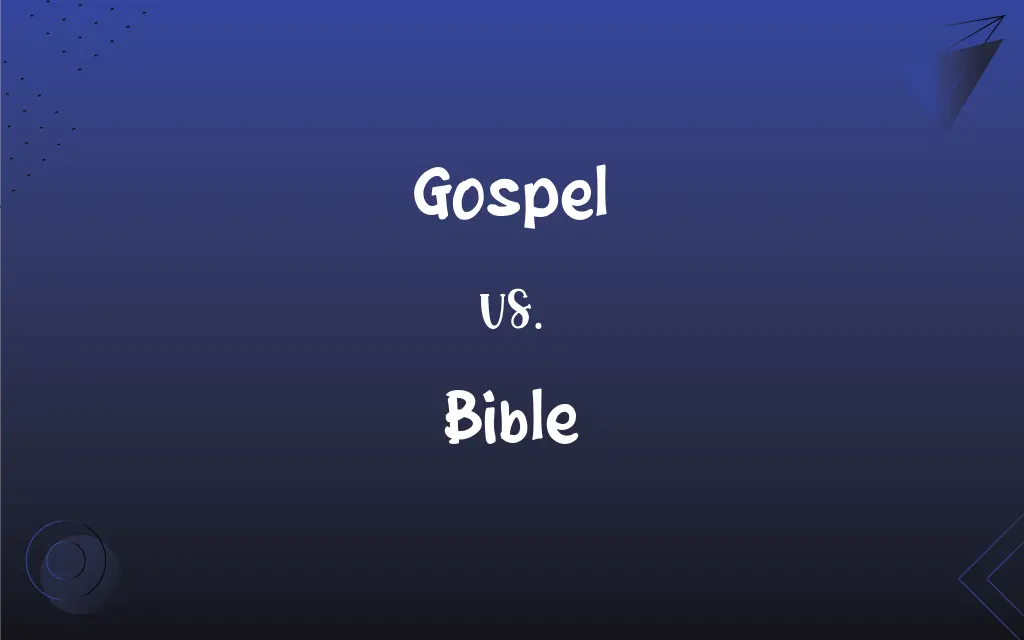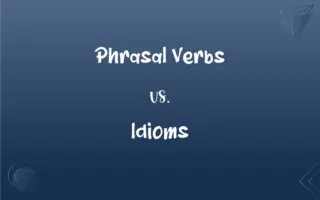Gospel vs. Bible: What's the Difference?
Edited by Aimie Carlson || By Janet White || Published on March 11, 2024
Gospel refers to the teachings of Jesus Christ or the first four books of the New Testament, while the Bible encompasses both the Old and New Testaments as the holy scripture of Christianity.

Key Differences
The gospel and the bible are foundational to Christian doctrine, yet they serve distinct roles within the faith. The term "gospel" originates from the Old English "godspell," meaning "good news" or "glad tidings." This good news refers specifically to the life, death, and resurrection of Jesus Christ, encapsulated primarily in the first four books of the New Testament: Matthew, Mark, Luke, and John. Conversely, the Bible is a comprehensive religious text that includes not only the Gospels but also a wide array of books divided into the Old Testament and the New Testament. The Old Testament begins with the creation of the world and chronicles the history and laws of the Jewish people, while the New Testament focuses on the life and teachings of Jesus and the early Christian church.
When discussing accessibility and use, the gospels are often read for direct insight into Jesus' life and teachings, offering a focused lens on his parables, miracles, and interactions with people. They are central in Christian worship and personal study for understanding Christ's nature and mission. The Bible, in its entirety, is used for a more comprehensive study of Christian theology, history, and morality, guiding believers in faith and practice across all aspects of life.
The interpretive approach to the gospels versus the Bible as a whole also differs. The gospels are interpreted with a particular emphasis on Christology—the nature and work of Jesus Christ—while the Bible's interpretation can encompass a wider range of theological themes, including creation, sin, redemption, prophecy, and eschatology. Scholars and theologians often delve into the gospels for insights into the historical Jesus, whereas the Bible is studied for both its immediate religious teachings and its broader cultural and historical contexts.
The impact and significance of the gospels and the Bible diverge in their scope of influence. The gospels have profoundly influenced Christian art, literature, and music, focusing on the figure of Jesus Christ. The Bible, with its vast and varied content, has shaped not only religious thought and practice but also broader aspects of Western culture and law. Both are indispensable to understanding Christianity, yet each serves a unique purpose within the faith's tradition and practice.
Comparison Chart
Definition
Account of Jesus' life and teachings
Collection of sacred texts in Christianity
ADVERTISEMENT
Content
Life, death, resurrection of Jesus
Old Testament, New Testament
Composition
Four books: Matthew, Mark, Luke, John
66 books (Protestant), more in other denominations
Primary Focus
Teachings and miracles of Jesus
Religious law, history, prophecy, and teachings
Use in Christianity
Evangelism, teaching about Christ
Worship, study, moral guidance
Gospel and Bible Definitions
Gospel
Good news of Jesus Christ.
The preacher shared the gospel with enthusiasm.
ADVERTISEMENT
Bible
The sacred scriptures of Christians.
The family read the bible every evening.
Gospel
First four books of the New Testament.
She read from the gospel according to Luke.
Bible
A book regarded as authoritative in a particular field.
This manual is the bible for amateur astronomers.
Gospel
Teaching or revelation of Christ.
His life was a living example of the gospel.
Bible
Collection of the Old and New Testaments.
The bible contains both Jewish and Christian scriptures.
Gospel
Something accepted as absolute truth.
Her words were taken as gospel by her followers.
Bible
A copy of the Christian or Jewish scriptures.
He gifted her a beautifully bound bible.
Gospel
Christian preaching or evangelism.
He went abroad to spread the gospel.
Bible
A guide or principle considered infallible.
The instructor's handbook was the bible for new teachers.
Gospel
Often Gospel The proclamation of the redemption preached by Jesus and the Apostles, which is the central content of Christian revelation.
Bible
The sacred book of Christianity, a collection of ancient writings including the books of both the Old Testament and the New Testament.
Gospel
Gospel(Bible) One of the first four New Testament books, describing the life, death, and resurrection of Jesus and recording his teaching.
Bible
The Hebrew Scriptures, the sacred book of Judaism.
FAQs
Is the gospel the same as the Bible?
No, the gospel refers specifically to the teachings and life of Jesus Christ, while the Bible includes a broader range of religious writings.
What is the gospel?
The gospel is the good news of Jesus Christ's life, death, and resurrection, specifically outlined in the first four books of the New Testament.
How many gospels are there?
There are four gospels: Matthew, Mark, Luke, and John.
Can the gospel exist outside the Bible?
While the gospel is part of the Bible, its message is also spread through preaching and teaching outside of the written text.
How many books are in the Bible?
The Protestant Bible contains 66 books, while Catholic and Orthodox Bibles include additional books in the Old Testament.
Why are the gospels important in Christianity?
The gospels are crucial for understanding the life, teachings, and significance of Jesus Christ.
What is the Bible?
The Bible is the collection of sacred texts or scriptures in Christianity, comprising the Old and New Testaments.
What is the oldest gospel?
Mark is generally considered the oldest gospel, written around AD 70.
How can one start reading the Bible?
Many recommend starting with the gospels to understand Jesus' life and teachings directly.
How is the Bible used in Christian worship?
The Bible is used for readings, teachings, and guidance in prayer and worship services.
Is the Bible consistent across all Christian denominations?
While the core of the Bible is consistent, some denominations include additional books in their version of the Old Testament.
Who wrote the gospels?
The gospels were traditionally attributed to Matthew, Mark, Luke, and John.
Can the moral teachings in the Bible and gospels apply to modern life?
Yes, believers find that the moral and ethical teachings in the Bible and gospels provide guidance for modern living.
Who decided what books went into the Bible?
The canon of the Bible was established by church councils and leaders over several centuries.
How do scholars interpret differences among the gospels?
Scholars examine historical, cultural, and textual contexts to understand and explain differences.
What languages was the Bible originally written in?
The Bible was originally written in Hebrew, Aramaic, and Greek.
What role do the gospels play in evangelism?
The gospels are central to evangelism, conveying the core message of Christianity to believers and non-believers alike.
Is reading the Bible essential for understanding the gospel?
Reading the Bible provides a comprehensive context for the gospel, enriching understanding of its message.
Are there differences between the gospels?
Yes, each gospel has its unique perspective on Jesus' life and teachings.
Why are there different versions of the Bible?
Different translations and interpretations have led to various Bible versions for clarity and understanding.
About Author
Written by
Janet WhiteJanet White has been an esteemed writer and blogger for Difference Wiki. Holding a Master's degree in Science and Medical Journalism from the prestigious Boston University, she has consistently demonstrated her expertise and passion for her field. When she's not immersed in her work, Janet relishes her time exercising, delving into a good book, and cherishing moments with friends and family.
Edited by
Aimie CarlsonAimie Carlson, holding a master's degree in English literature, is a fervent English language enthusiast. She lends her writing talents to Difference Wiki, a prominent website that specializes in comparisons, offering readers insightful analyses that both captivate and inform.
































































